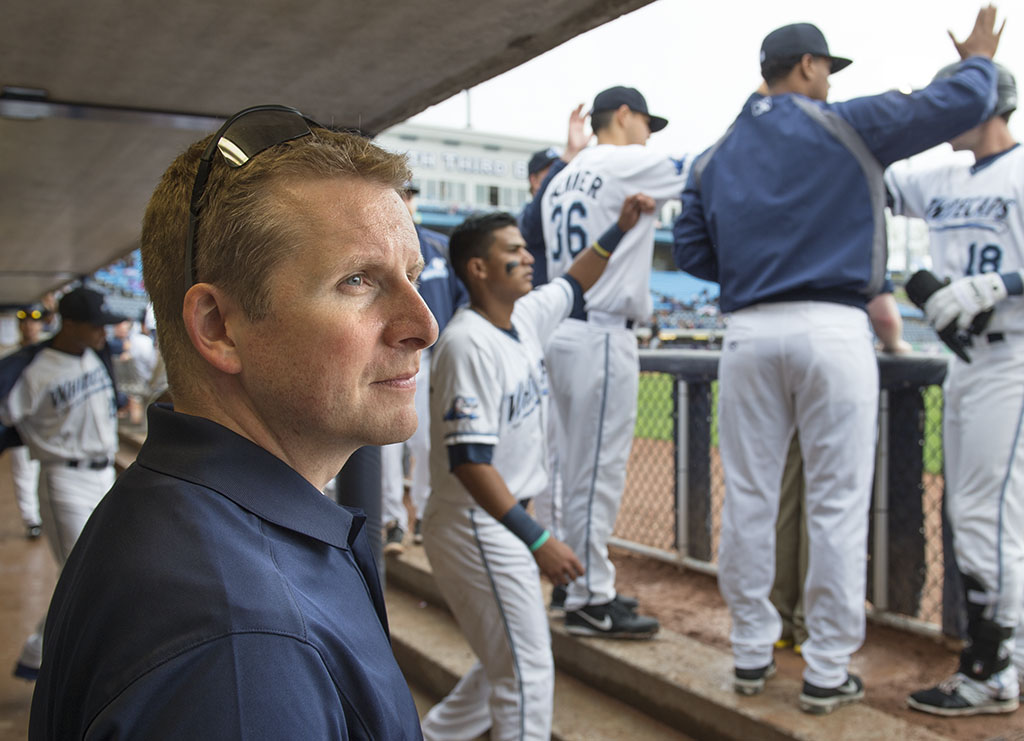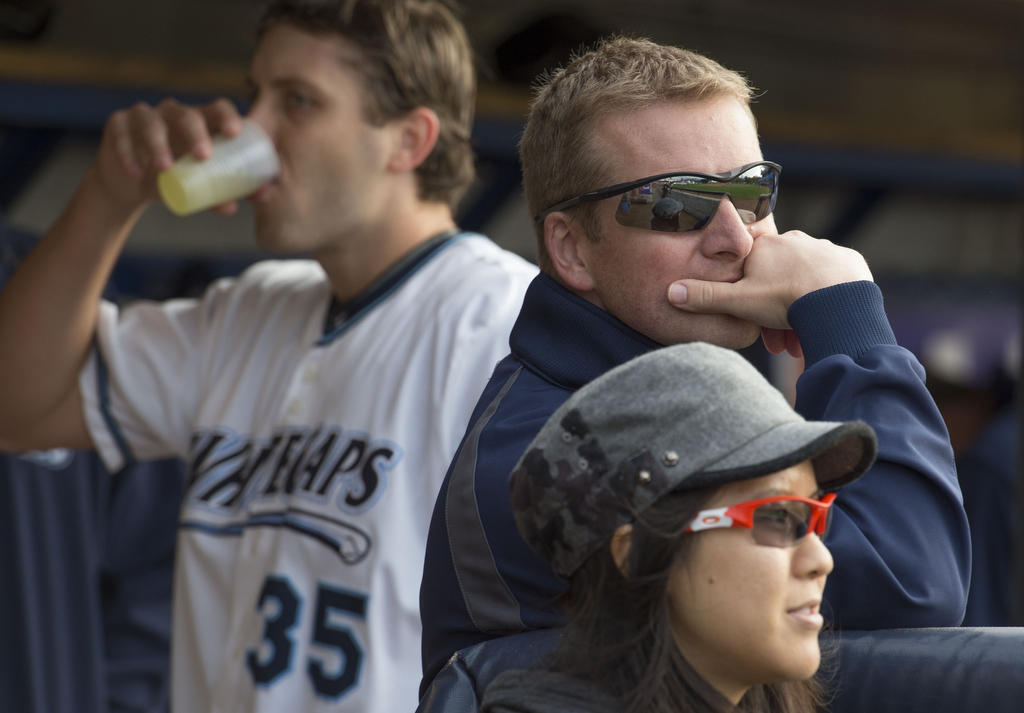A slight breeze drifted in from left field as Matt Axtman stood in the West Michigan Whitecaps dugout and watched second baseman Joey Pankake run down a pop fly to end the top of the first inning.
Axtman breathed a slight sigh of relief as Pankake called off the outfielders to avoid a collision at Fifth Third Ballpark.
Axtman will never show up in the batter’s box or on the stat sheet, but he’s an integral part of this minor league Detroit Tigers team.
Axtman is Matt Axtman, DO, a sports medicine specialist with Spectrum Health Medical Group Orthopaedics & Sports Medicine—and the Whitecaps’ team doctor.
Although he works the bulk of the games, other physicians in his practice take turns in the rotation, too. The partnership between Spectrum Health and the Whitecaps formed in 2011.
Dr. Axtman, a Wisconsin native who grew up cheering for the Milwaukee Brewers, attends many home games and is available in the dugout to treat players if they suffer an injury.
“If I’m bored, that’s a good thing,” he said between innings. “You really don’t want the doctor working.”
In the past, Dr. Axtman has dealt with an outfielder with a quad strain, an infielder with a fractured foot, a pitcher with a pec strain and another pitcher with lower back spasms.
Fortunately, the Whitecaps have been healthy recently. Dr. Axtman estimates he treats an injury in only about 10 to 15 percent of the games he attends. Players are in peak physical condition due to work with team strength and conditioning coaches.
“There’s almost a better chance of someone in the crowd getting hit by a ball than a player getting injured,” Dr. Axtman said.
On this day, a sunny Sunday contest against the Cleveland Indian minor league affiliate Lake County Captains, everyone was safe on the Whitecaps side.
Before the game, Dr. Axtman walked over to the Lake County dugout to check on a player complaining of thoracic pain. (Yes, he helps the competition, too.)
Upon return to the Whitecaps dugout, he reported to Whitecaps athletic trainer T.J. Obergefell: “Nothing exciting over there. Just some thoracic pain that has been going on for a while.”
Obergefell runs the show, according to Dr. Axtman. If a player does get injured during a game, the athletic trainer runs onto the field to check on him.
After the player returns to the dugout, Dr. Axtman does an initial evaluation to see if the player can return to the field, then if necessary, takes the player to the upstairs clubhouse for further testing.
Dr. Axtman, dressed in a Whitecaps logo shirt and tan pants, keeps an especially close eye on players who have had injuries in the past.
“I see how they’re running. Are they pulling up?” he said. “Is there something you see mechanically? The Detroit Tigers have invested so much into these athletes. I don’t want to take that investment and do something terrible.”
As Dr. Axtman spoke, the crack of a bat echoed through the air. He smiled. A Whitecaps player had belted out a single.
Standing next to Dr. Axtman in the dugout, Obergefell said having a doctor on the team makes for efficient service.
“It’s comforting,” Obergefell said. “We get a quick turnaround if something is going on. We don’t have to make an appointment to bring the guys to the office for little stuff.”
Axtman, a former assistant team physician for the Atlanta Dream and Georgia Tech Basketball and medical consultant for the Atlanta Falcons, said the Whitecaps’ team doctor role is one of the reasons he took the job with Spectrum Health coming up on three years in July.
“So far it’s a good day,” he said. “It’s a good day on the job working. It’s a very unique opportunity that very few people can say that they do.”
During a typical game, Dr. Axtman will chat with the athletic trainer prior to the first pitch.
“Are there any ongoing issues, any lingering injuries we need to monitor? We take a look at the injured players to see how they are progressing and when we can get them back. We determine if we need to take a look with some imaging. Then I sit and watch the game and hope and pray nothing bad goes down.”
There’s no X-ray machine in the training room, so if Dr. Axtman wants imaging, the players come to his clinic. If the injury is emergent, he sends them to urgent care.
“I like the athletes,” he said. “They’re very nice people and they like to have fun. The thing I like about sports medicine is people always want to get better. They typically listen to what you want them to do.”
Dr. Axtman serves as head physician for several gyms in the area as well as the Grand Rapids Ballet.
But he doesn’t just care for athletes. His patients range from 18 months to 95 years old.
“In one instance I can see a 16-year-old baseball player,” Dr. Axtman said. “The next I’m seeing an 88-year-old with knee pain.”
Although the Whitecaps went on to lose this particular game 4-1, the partnership is apparently a win-win for both Spectrum Health and the West Michigan Whitecaps.










 /a>
/a>
 /a>
/a>
 /a>
/a>